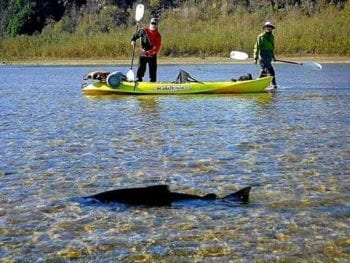Eel River salmon still feeling effects of drought
Even though we’ve had a little rain, the effects of the lingering drought are still being severely felt by California’s fish. The Eureka Times-Standard story underscores how dire the conditions are on the North Coast for fall run Chinook. Furthermore, the effects this current situation is having on the ability for returning salmon to spawn will be felt for several years to come.
Since Chinook salmon began entering the drought-stricken river this year, they were met with near-historic low flows preventing their upriver migration to spawning areas, a currently unexplained blindness and “zombie-like” behavior, poachers, and cars running over what spawning grounds they can find.”
A low spawning success rate can equate to diminished returns 3 or 4 years from now. CalTrout is working in the Eel River to build resiliency throughout the entire system – from the headwaters to the estuary. The Eel is a very important system for wild fish in California and it’s going to take an entire watershed approach to mitigate the impacts of a changing climate for wild salmonids.
For more on CalTrout’s Keystone Initiative work on the Eel River system click here.
Click to read the full article in the Times-Standard.





